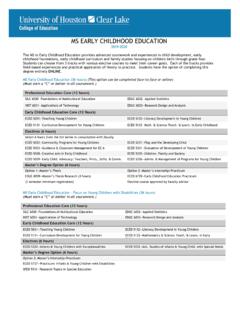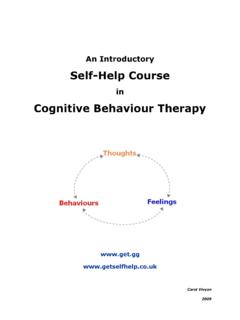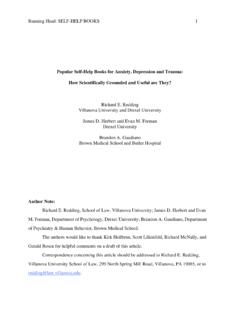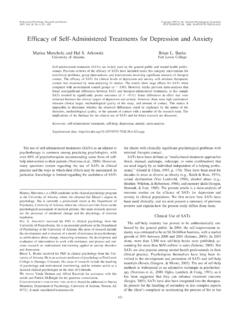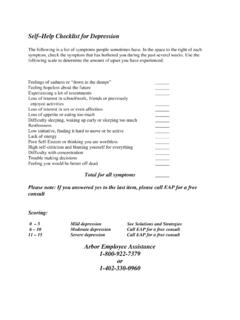Transcription of Depression Awareness - University of Houston–Clear Lake
1 Counseling Services 281-283-2580 University of houston - clear lake , SSCB 3103 2700 Bay Area Blvd., houston , TX 77058 Page 1 of 7 Depression Awareness Myths and Facts Myth: Depression doesn t affect me. Fact: In a survey by the American College Health Association, 30% of college students reported feeling so depressed at some point in time that they have trouble functioning. Myth: Depression is not a real medical problem. Fact: Depression is a real & serious condition, no different than diabetes or heart disease in its ability to impact someone s life. It can have both emotional and physical symptoms and make life very difficult for those who have it.
2 Myth: Depression is something that strong people can snap out of by thinking positively. Fact: People with Depression cannot just snap out of it any more than someone with diabetes can. Depression is not a choice or a sign of weakness and laziness; it is a health problem resulting from environmental and biological factors. Myth: Depression will just go away on its own. Fact: While for some people, Depression may go away without treatment, this is not usually the case. Without treatment, symptoms of Depression can continue for weeks, months, or even years. Myth: Talking about Depression only makes it worse. Fact: It is easy to understand why some worry about discussing their Depression , but being alone can be even more harmful.
3 If you are Counseling Services 281-283-2580 University of houston - clear lake , SSCB 3103 2700 Bay Area Blvd., houston , TX 77058 Page 2 of 7 hesitant to talk with a close family member or friend, consider a faculty member, spiritual leader, or counselor. Myth: Depression only happens when something bad happens in your life, such as a breakup, the death of a loved one, or failing an exam. Fact: Depression is more than just having occasional sad thoughts. Depression can arise suddenly, even when things in life seem to be going well. College and Stress Sources of Stress Greater academic demands Balancing classes, work & social life. Being on your own in a new environment Changes in family relations Homesickness Financial responsibilities Changes in your social life Uncertainty about the future after college Alcohol or drug abuse Exposure to new people, ideas, and temptations Preparing for life after graduation Ways of Coping Talk to a trusted family member or friend Exercise Counseling Services 281-283-2580 University of houston - clear lake , SSCB 3103 2700 Bay Area Blvd.
4 , houston , TX 77058 Page 3 of 7 Eat a balanced diet Get enough sleep Pay nature a visit Play with a pet Schedule a meeting with a counselor Symptoms of Depression Overwhelming sadness/ despair Hopelessness-"it's never going to get better" Physical aches and pains Loss of interest in activities Appetite changes Change in weight Fatigue Lack of motivation Sleep Disturbances Feeling guilty or worthless Low self -esteem Anxiety Trouble with concentration Thoughts of death or suicide Counseling Services 281-283-2580 University of houston - clear lake .
5 SSCB 3103 2700 Bay Area Blvd., houston , TX 77058 Page 4 of 7 Types of Depression Bipolar Disorder: May experience alternating periods of Depression and/or elevated mood ( mania) Depression Times of sadness, decreased energy or motivation Loss of interest in activities once enjoyed, including sex Feeling tired or slowed down. Problems concentrating, remembering, and making decisions Restlessness or irritability Thinking of death or suicide or attempting suicide Mania Times of elevated mood or irritability Impulsive behavior Periods of feeling "high or overly happy Talking fast/jumping from idea to idea Restlessness Sleeping little and not feeling tired Unrealistic beliefs in one s ability Engaging in high risk behaviors Seasonal Affective Disorder Seasonal Affective Disorder (SAD) is a type of Depression that typically occurs in the winter when daylight hours become shorter.
6 Is thought to occur due to a lack of sunlight. symptoms lessen when the season changes. Counseling Services 281-283-2580 University of houston - clear lake , SSCB 3103 2700 Bay Area Blvd., houston , TX 77058 Page 5 of 7 You may have if: You have been depressed during the same season for several years in a row and felt better after the season changed You crave carbs, gain weight and sleep more during the winter Who is more Likely to experience People who live in areas where winter days are very short or there are big changes in the amount of daylight in different seasons. Women The risk of getting for the first time goes down as you age.
7 Family history of The Difference between and Depression Sadness is a normal reaction in response to a loss or troubling situation. Sadness is temporary; Depression lasts longer and is more severe. Usually, one can experience relief from sadness when one has dealt with the situation or event that caused sadness. Depression doesn t go away after you ve dealt with whatever has made you sad ( someone close to you passing away). What may increase your risk of Depression ? Life stress (ex: financial, family, illness, loss of loved one) Lack of social support, isolation Family history of Depression Traumatic brain injury Genetic/inherited traits or genes Baby Blues symptoms Mood swings Anxiety Counseling Services 281-283-2580 University of houston - clear lake , SSCB 3103 2700 Bay Area Blvd.
8 , houston , TX 77058 Page 6 of 7 Feeling sad More easily upset/angered Short crying spells Can t concentrate Trouble sleeping Postpartum Depression - symptoms Symptoms longer-lasting & more intense than the baby blues Severe mood swings Very tired/trouble sleeping More easily upset/angered Not wanting to be around friends/family Thoughts of harming yourself or your baby Are you at increased risk for postpartum Depression ? history of Depression prior to pregnancy family history of Depression or bipolar disorder other life stressors (pregnancy complications, sickness, job loss, financial problems) relationship issues lack of a support system When should you get help ?
9 If you're feeling bad for more than 2 weeks You're feeling worse instead of better Having a hard time caring for your baby Can't do your everyday activities Thoughts of harming yourself or your baby Counseling Services 281-283-2580 University of houston - clear lake , SSCB 3103 2700 Bay Area Blvd., houston , TX 77058 Page 7 of 7








